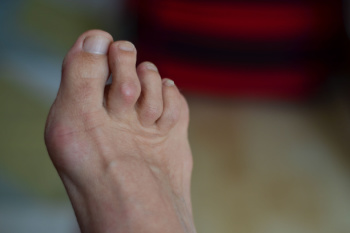 A hammertoe is a deformity that causes one of the toes, typically the second, third, or fourth, to bend downward at the middle joint, resembling a hammer. This condition often results from an imbalance in the muscles, tendons, or ligaments that hold the toe straight, and it can be exacerbated by wearing tight or ill-fitting shoes. Arthritis, injury, or a genetic predisposition can also contribute to its development. Hammertoes can be painful, especially while walking or wearing shoes. They may cause corns or calluses to form on the top of the joint or at the tip of the toe due to constant friction. If left untreated, hammertoes can lead to more severe complications, such as open sores or difficulty in walking. Relief options include wearing proper footwear with a roomy toe box, using orthotic inserts, and performing toe exercises to strengthen and stretch the muscles. In severe cases, surgical intervention may be necessary to correct the deformity. If you have a hammertoe that is causing you discomfort, it is suggested that you schedule an appointment with a podiatrist for the best treatment plan.
A hammertoe is a deformity that causes one of the toes, typically the second, third, or fourth, to bend downward at the middle joint, resembling a hammer. This condition often results from an imbalance in the muscles, tendons, or ligaments that hold the toe straight, and it can be exacerbated by wearing tight or ill-fitting shoes. Arthritis, injury, or a genetic predisposition can also contribute to its development. Hammertoes can be painful, especially while walking or wearing shoes. They may cause corns or calluses to form on the top of the joint or at the tip of the toe due to constant friction. If left untreated, hammertoes can lead to more severe complications, such as open sores or difficulty in walking. Relief options include wearing proper footwear with a roomy toe box, using orthotic inserts, and performing toe exercises to strengthen and stretch the muscles. In severe cases, surgical intervention may be necessary to correct the deformity. If you have a hammertoe that is causing you discomfort, it is suggested that you schedule an appointment with a podiatrist for the best treatment plan.
Hammertoe
Hammertoes can be a painful condition to live with. For more information, contact Arthur Segall, Jr., DPM from Segall Foot and Ankle. Our doctor will answer any of your foot- and ankle-related questions.
Hammertoe is a foot deformity that affects the joints of the second, third, fourth, or fifth toes of your feet. It is a painful foot condition in which these toes curl and arch up, which can often lead to pain when wearing footwear.
Symptoms
- Pain in the affected toes
- Development of corns or calluses due to friction
- Inflammation
- Redness
- Contracture of the toes
Causes
Genetics – People who are genetically predisposed to hammertoe are often more susceptible
Arthritis – Because arthritis affects the joints in your toes, further deformities stemming from arthritis can occur
Trauma – Direct trauma to the toes could potentially lead to hammertoe
Ill-fitting shoes – Undue pressure on the front of the toes from ill-fitting shoes can potentially lead to the development of hammertoe
Treatment
Orthotics – Custom made inserts can be used to help relieve pressure placed on the toes and therefore relieve some of the pain associated with it
Medications – Oral medications such as anti-inflammatories or NSAIDs could be used to treat the pain and inflammation hammertoes causes. Injections of corticosteroids are also sometimes used
Surgery – In more severe cases where the hammertoes have become more rigid, foot surgery is a potential option
If you have any questions please contact our offices located in Plantation, FL Ft. Lauderdale, F . We offer the newest diagnostic and treatment technologies for all your foot and ankle needs.
